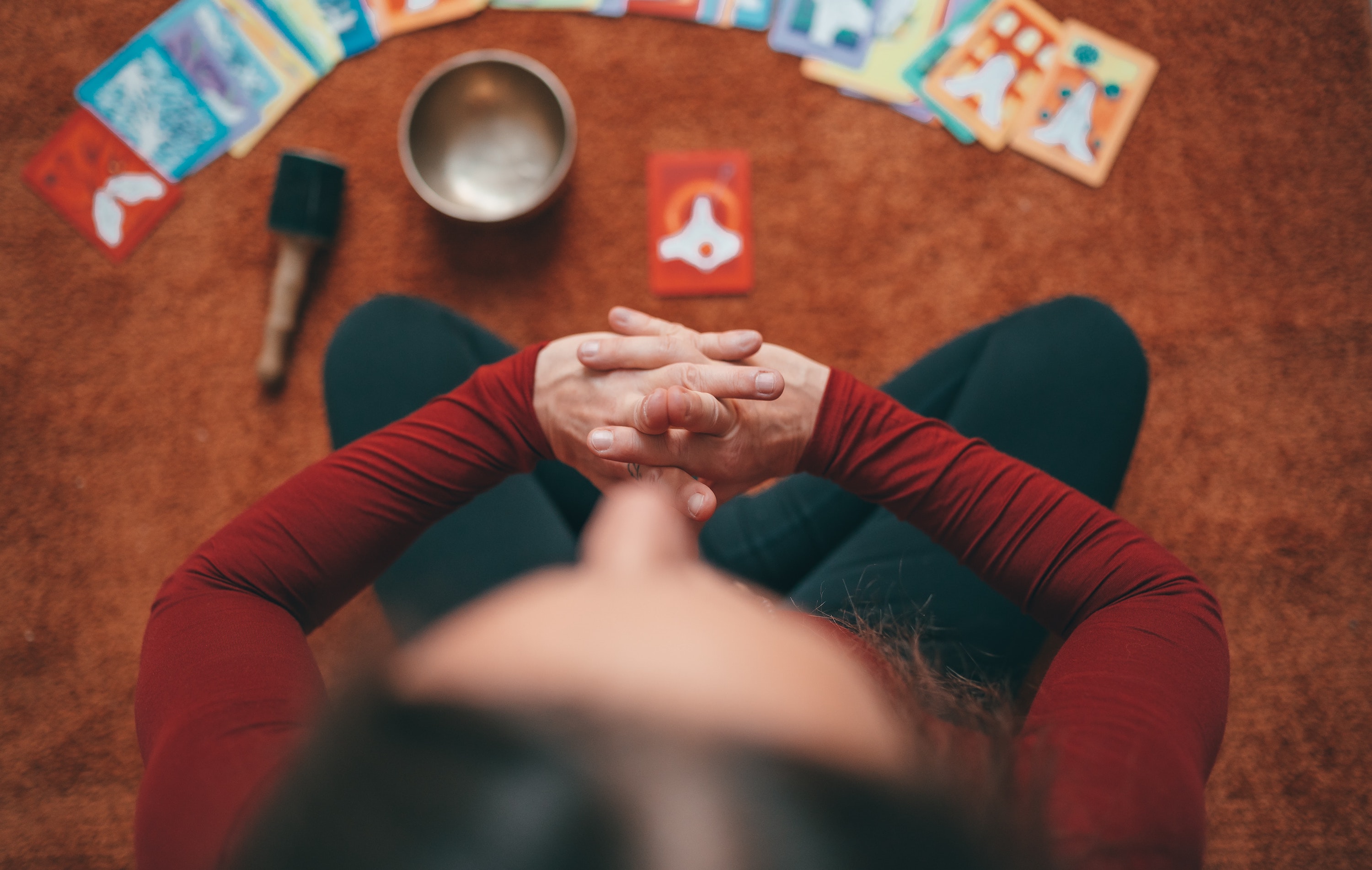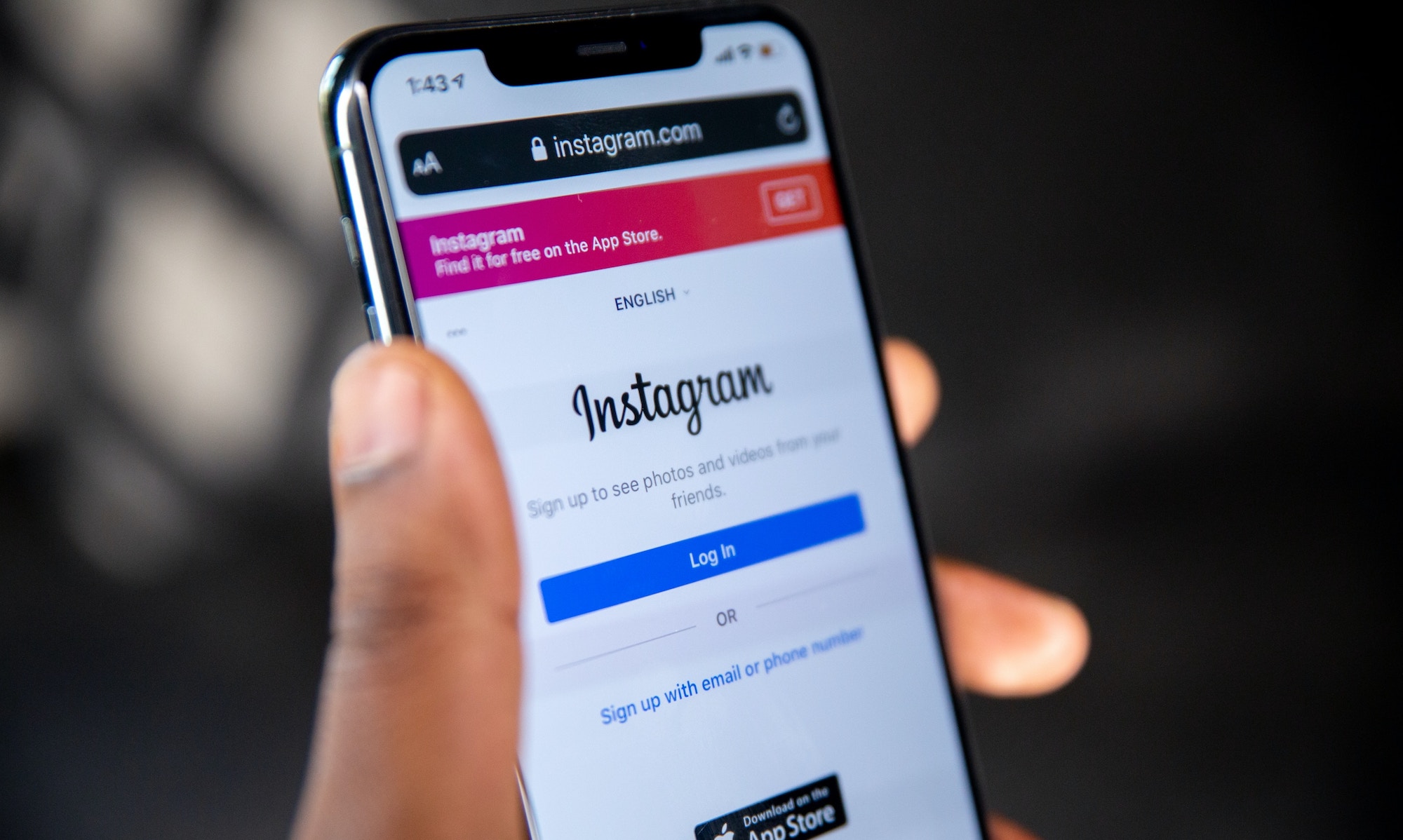Spiritual TikTok: Content creators target digital worship (of all things)

Listen to this article:
I’m gonna jump out on a ledge here and surmise you’ve stopped at some point to wonder at some of life’s biggest questions.
You know, like, is there a god?
How can I improve my spiritual well-being?
Do crystals have healing powers?
Do ouija boards really work or is my friend just moving it around?
Oof! These are the kinds of questions that make your head spin—but also the questions that nag at you, begging you for answers.
Traditionally, people have sought answers to these big questions from spiritual gurus, religious leaders, palm readers, prophets, books, community groups (sometimes cults), nature, psychedelics, and other physical sources.
But, with the advent of the Internet, the growth of the Creator Economy, and the rise of TikTok as a source of information, spiritual enlightenment is innovating right along with popular technology.
Today, many spiritual gurus and thought leaders are using social media to share their insights, make claims, and build a following. In short, spiritual creators are hopping on the digital content creation bandwagon, and audiences are paying attention.
The decline of traditional religion and the rise of spiritual creators in the digital world
Religion has been motivating personal and political actions since the dawn of time. But, research shows a recent and staggering decline in religious affiliation, especially among younger generations.
Pew Research Center recently surveyed people in 106 countries and found young adults are significantly less likely than adults to claim religious affiliation in 41 of those countries.

In other words, young adults today are more likely to be unaffiliated with a particular religion.
Even though religious affiliation is low among youngsters, social media (especially TikTok) usage is not. In fact, 63 percent of TikTok users are between the ages of 10 and 29.
Additionally, even if younger generations are moving away from traditional religion, it doesn’t mean they are losing interest in spirituality. And, they’re seeking it out in unconventional places: Like TikTok, for starters.
A recent study found people are flocking to TikTok as a way to lift their spirits (no pun intended,) and 60 percent of people reported feeling a sense of community on TikTok.
Some people have explicitly stated that TikTok is a place where they go to find a connection to the spiritual. In Celeste Cox’s article for the Click, Halyna Krylyuk said TikTok is a source of spirituality:
“In the pandemic, TikTok affected my spirituality by giving me more knowledge about interpreting birth charts and different qualities of crystals...The Brooklyn resident is part of an ever growing group of young people who are using the popular platform to experiment with spirituality and New Age ideas,” according to the article.
Krylyuk isn’t alone in her quest for spiritual answers via digital platforms. A quick search on Google trends shows upward movement on topics like spirituality, astrology, tarot, and crystals.
But, if you want a real eye-opening look into the rise of spirituality on social media, take a gander at TikTok’s hashtag repository.
#SpiritualTikTok has 7.7 billion views with videos on topics ranging from finding meaning in your birth year to what happens after we die and everything—and I mean everything—in between.

In light of the COVID-19 pandemic, when people stayed at home, went to church via Zoom, and started spending more time online, it makes sense why people started showing more interest in spirituality on social platforms.
But, here’s where things get interesting. Even though people are meeting in person again, spiritual creators are sticking around online and spiritual topics continue to trend within online social communities. Let’s dive into some of the most popular spiritual trends on social media.
Spiritual trends via social media
There are literally hundreds of spiritual trends popping up on social media. Creators discuss every religion under the sun, self-help techniques, meditation, and anything else you could possibly dream of. Here are three of the most popular and interesting trends from spiritual creators.
1. Manifestation
You’ve heard of the book “The Secret” by Rhonda Byrne. The idea is if you set your intentions and communicate those intentions to the universe—you’ll get what you desire.
The manifestation trend is this idea on steroids. It’s all about leveraging the law of attraction and fine-tuning your mindset to learn how to get what you want.
Manifestation is taking off on TikTok and has already garnered 19.2 billion views.

@/Vibinwithciicii is an example of a spiritual creator who advises her followers on manifestation techniques.
If you wander over to her page, you’ll find video after video on:
- Manifestation techniques to get everything you desire (i.e., Make the universe your own personal Alexa)
- How to make people obsessed with you (a little weird, IMO)
- How to take your power back
- How to release patterns that keep you down
While addressing the universe the same way you’d talk to Alexa may seem a bit over the top, CiiCii’s 9 million likes show people love her overall positive energy and manifestation advice.
2. Yoga
I always thought of yoga in simple terms—a healthy exercise, a stretching and balancing technique, and even as the brunt of some relatable and hilarious jokes in popular sitcoms like Broad City.
But, the rise of yogis who are using social media to teach the world about yoga shows that it’s so much more. These spiritual creators are touting yoga as a way to connect with the divine, center yourself, achieve balance, and even manage mental and spiritual health.
Yoga has more than 16.6 billion views, and yogis all over the world are sharing their insight, but Nish The Fish stands out as a creator with positive messages and a robust following.
If you navigate to Nish The Fish’s page, you’ll find more than tips on how to participate in yoga. You’ll find:
- Analysis of why we are unhappy and what to do about it
- Theories on how the world came into being
- Discussions on whether there is a God
- Why you should premise your life on spirituality
- How we are all interconnected
Nish The Fish doesn’t only live on TikTok. He also offers advice on Instagram, in podcasts, and in live sessions.
3. Astrology
If your horoscope has ever piqued your interest and you’ve been wanting to learn more about the stars, now is your chance.
Astrology tops the charts in popularity among these three trends with 41.1 billion views and thousands of creators joining in on the conversation.

Creators discuss everything related to astrology, inducing Zodiac signs, birth chart placements, and the sun, moon, and stars.
As mentioned, there are thousands of creators talking about astrology. But, @/e.mo.tions is particularly fitting for this article because he focuses on using astrology for the sake of manifestation.
If you check out his page, you’ll find:
- How to manifest for the luckiest day of the year
- How to use astrological events to achieve what you desire
- What to do during lucky new moon dates
- What Jupiter in retrograde might mean for you
- Tarot readings
Bottom line: The rise of spiritual creators and new trends are giving people access to spiritual ideas and insights they may never have considered before. And these trends are influencing people in new and significant ways—for good and bad.
What happens when spiritual creators access the absolute power of social media—influence?
With the number of people flocking to social media for spiritual guidance and life advice, it’s critical to remember how many people social media reaches and how powerful its influence truly is.
Recent stats show there are 3.78 billion global social media users worldwide, which represents nearly half of the global population.
While we like to think only Gen Z spends time online, the truth is that loitering online is a cross-generational trend.
According to Pew Research Center, 84 percent of people ages 18 to 29, 81 percent of people 30 to 49, and 73 percent of those aged 50 to 64 use social media.
Not only are more and more people of all ages spending an abundance of time online, but cultural movements, stats, and anecdotes prove how heavily people are influenced by online conversations—especially from influencers.
Many social posts are benign in nature—maybe even boring. Social posts from influencers can also be incredibly helpful for finding inspiration, recommendations, interesting brands, and exploring new ideas.
But, social media and its power to influence isn’t always benign or positive. In fact, it’s quite common for people to assign value and credibility to influencers based on follower count alone—regardless of the messages they are spreading.
In other words, without doing research and background checks, we’ve made cultural icons and moral authorities out of influencers. And this can have significant implications when dealing with the spiritual and the moral.
While the rise in spiritual creators has brought new and interesting spiritual ideas to light, it’s also essential to hold them to a higher standard than other types of influencers.
Advising on moral and spiritual matters inherently has higher stakes than offering cool product recommendations, and it’s essential to continue to question whether follower count is a real endorsement of credibility.











.jpeg)









.jpg)
.jpg)
.jpg)
.png)



.png)























































.jpg)


























